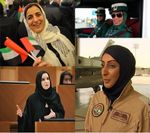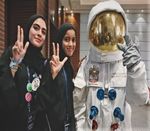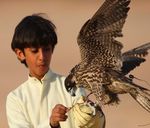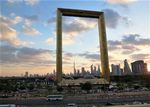THE UNITED ARAB EMIRATES: PAST, PRESENT, FUTURE
←
→
Page content transcription
If your browser does not render page correctly, please read the page content below
ASIA DEEP DIVE: 18th – 31st January 2020 THE UNITED ARAB EMIRATES: PAST, PRESENT, FUTURE Not long ago, the Arabian Peninsula was inhabited by proud and resourceful desert-dwelling nomadic tribes, and settled with fishing villages and date farms. Today, the UAE is a major international transport, communications, trade, and industrial center as well as one of the most modern, stable and safe countries in the world. It has a major influence in leading and shaping directions of global development. Participants in this immersion program will trace key themes involved throughout the evolution of a small Arab- Islamic country and its rapid transformation into an influential builder of the future: diversity, equality and cohesion; preservation and innovation; security and sustainability; health, justice and education; infrastructure, technology and economy; vision, opportunity and leadership. “A nation without a past is a country without a present or a future.” Sheikh Zayed bin Sultan Al Nahyan
THE UNITED ARAB EMIRATES: PAST, PRESENT, FUTURE
Historical study incorporates a variety of objects, diverse sets of evidence, and examination from multiple, often
conflicting viewpoints. Analysis of contemporary developments is not straightforward, and future predictions
are both uncertain and reliant on risk and creativity.
By the end of the two-week program, each participant will have had opportunity to explore the lifespan of the
UAE via visits across the country to significant places, institutions, and communities. As they explore, each
participant will focus on one of the themes that have been continuous in the development of the UAE. They will
do this as part of a group.
Groups formed of students from different countries and cultures are a useful unit to embark on historical,
contemporary, and future thinking. This is because the different backgrounds of students are a source of
questioning and challenge, and the team spirit provides security and motivation. Therefore, participants from
AUA universities will join with UAEU students to form groups, and each group will take one of the themes
relevant to the development of the UAE. At the end of the program, students will present their interpretation of
how their theme has been important in the past, is relevant right now, and will be significant in the future.
So, for example, during trips to the Sheikh Zayed Mosque or the Louvre Museum in Abu Dhabi groups can ask
questions from their unique perspectives of:
diversity, equality and cohesion;
preservation and innovation;
security and sustainability;
health, justice and education;
infrastructure, technology and economy;
vision, opportunity and leadership.
Alternatively, during a trip to Dubai, each group can apply their unique
perspective to the challenges and opportunities involved in creating this
world-city and its success. Similarly, the themes provide direction for questions
and evidence seeking about the development of the UAE when we go out to
explore the geography, climate and environment of the seven Emirates. Finally,
at UAEU we have experts who can provide expert input specific to the theme of
each group – as lectures to all, or as tutors to groups.
We also want participants to have a great social time, learning about each other’s
cultures and languages, and those of UAEU students. There will be quizzes and
competitions along the way, allowing students to showcase what they have gained
from interaction with each other. We will also host a cultural night where students
can demonstrate something that they think is significant about their culture – a
costume, a dance or music, some food, an artefact, story, or piece of media. These
multi-cultural experiences are the hallmark of the UAE (past, present and future)
and are the challenge – and opportunity – that UAE residents have in living together
in this society. We would like AUA participants to share in this richness.
“A nation without a past is a country without a present or a future.” Sheikh Zayed bin Sultan Al NahyanIndicative Program
Day / Date Event Location
#1 Saturday 18th Arrival of participants Dubai (DXB) or Abu
Dhabi (AUH)
Travel to accommodation Al Ain
#2 Sunday 19th Morning: Opening of Program Al Ain
Welcome address
Introduction to program
Illustration and explanation of themes
Group formation activities with faculty input
Afternoon:
45 mins Arabic lesson: How are you?
2 hours lectures: UAE timeline; preservation and innovation
Campus tour
Evening:
Student social (organized)
#3 Monday 20th Morning: Al Ain
45 mins Arabic lesson: Who am I?
2 hours lectures: diversity, equality and cohesion; geography
and environment; energies
Afternoon:
Group work tutorials with faculty input
Al Ain tour [1]
Evening:
Dinner at an Emirati Restaurant
#4 Tuesday 21st Field Trip to Abu Dhabi: e.g. Sheikh Zayed Mosque, Qasr Al Hosn, Bus, Abu Dhabi,
Louvre, Mangroves, MASDAR, Falcon Hospital with lectures return to Al Ain
#5 Wednesday 22nd Morning: Al Ain
45 mins Arabic lesson: How many and when?
2 hours lectures: security and sustainability; infrastructure,
technology and economy
Afternoon
Group work tutorials with faculty input
Al Ain tour [2]
Evening:
Camels and Desert experience
#6 Thursday 23rd Field Trip to Dubai: Museum of the Future; the MBR Space Center Bus, Night in Dubai
#7 Friday 24th Field Trip to Dubai: Burj Khalifa, Dubai Opera, Downtown tour Bus, Night in RAK
#8 Saturday 25th Field Trip: “Mountains, deserts and coast” to include fishing and Bus, Northern
pearling, flora and fauna. Emirates, return to
Al Ain
“A nation without a past is a country without a present or a future.” Sheikh Zayed bin Sultan Al Nahyan#9 Sunday 26th Morning: Al Ain
45 mins Arabic lesson: Where and who?
2 hours lectures: vision, opportunity & leadership; national
identity; government in the UAE and GCC
Afternoon:
1 hour lecture: health, justice and education
Group work with faculty input
Evening:
Student social (informal)
#10 Monday 27th Morning: Al Ain
Arabic lesson: Writing my name
Lectures: Engineering the future; tolerance and happiness
Afternoon:
Lecture: Science in the Arab world into the future
Group work tutorials
Evening:
Cultural Night
#11 Tuesday 28th Morning: Al Ain
Languages: Student Competition
2 hours lectures: Arts, media; sport past & present
Afternoon:
2 hours lectures: Trade and transport: hubs, routes, animals
and vehicles
Group work: preparations
Evening:
Mountain top sunset: Jebel Hafeet
#12 Wed 29th Morning: Al Ain
Group work: final preparations
Afternoon:
Presentation of student projects
Evening:
Student celebration with prize giving
#13 Thursday 30th Morning: Al Ain
Closing reception
Afternoon:
No trip to the UAE is complete without a Mall and Souq
experience! Or, Al Ain Safari Park.
Evening:
Film night: Emirati Cinema
#14 Friday 31st Breakfast (boxed) and Departure of participants Dubai (DXB) or Abu
Dhabi (AUH)
“A nation without a past is a country without a present or a future.” Sheikh Zayed bin Sultan Al NahyanInvitation to Participate
Each AUA member institution is invited to nominate up to 2 students to participate on this program. In addition,
each AUA member institution may nominate up to 2 students to be held on a waiting list.
The total number of students to be hosted by UAEU will not exceed 30 students. To ensure that UAEU is able to
host the maximum number of students, the UAEU will allocate (randomly) from the waiting list to fill spare
places resulting from AUA member institutions not nominating their quota of 2 students by the stated deadline.
Student Eligibility to Participate
Students from any undergraduate program may apply to their institution for nomination, if they have completed
one year of study (full time or equivalent) at the time of their application.
Students should have a reasonable command of English in order to participate and benefit fully from the
program. Confirmation of the student’s ability must be provided within the application as stated. UAEU will not
provide translators to students’ native languages and all sessions will be in English (the language of education at
UAEU) unless otherwise stated (e.g. Arabic lessons). By nature of the program, some of the input from non-
UAEU contributors may be in Arabic in which case the UAEU will ensure interpretation into English only.
Nominations
Nominations from each AUA member institution must be provided by their institutional program coordinator to
the UAEU at DDAUAE@UAEU.AC.AE by Friday 29th November.
The UAEU will not accept applications sent by individual students.
Provided by the UAEU
1. Invitation letters for visa purposes (if notified on the application form)
2. 300 USD to each AUA participant, via the fund given to UAEU by the AUA
3. Accommodation and meals from 18th January to 30th January 2020 (inclusive)
4. Airport transfers (students must arrange to arrive/depart at DXB or AUH within 4 arrival timeslots and 4
departure timeslots).
5. Free internet access and study materials
6. Entrance fees
Bourne by the Participant
1. Flights (arrangements and cost)
2. Visa fees
3. Insurance (medical and personal)
4. Additional expenses outside the terms of the program.
Expectations and Responsibilities of the Participants
The UAE is a tolerant multi-cultural Islamic country. Students will learn about its norms, rules, and traditions
and they must ensure their conduct respects these. Dress should be modest. Behavior must be courteous and
language polite. Students must not consume alcohol or prohibited substances, and the UAEU campus is tobacco
(smoke) free. All individuals present in the UAE must act within the law of the UAE; the legal authorities
maintain the right to take action against anyone infringing the law.
“A nation without a past is a country without a present or a future.” Sheikh Zayed bin Sultan Al NahyanYou can also read


























































